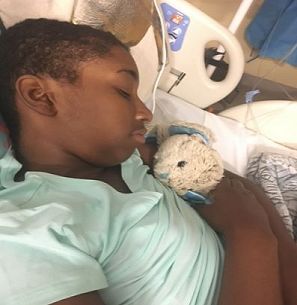CLEVELAND — Marie Fipps is only 16 years old, but she's already experienced pain like many others have not.
"One of the pain symptoms that I went (through) was like a needle-sharp pain just a lot of pain," Marie said.
Marie was born with sickle cell disease, a genetic blood disease that affects red blood cells.
It causes patients to have severe and debilitating pain and caused Marie to spend most of her life in and out of the hospital. She even missed out on a trip to Disney World.
"I remember just being there for a couple of hours and then I got sick because of the heat. Like I know with sickle cell, it affects you in like heat, in hot weather and also in cold weather. But I just remember getting there and spending some time there and then having to go back because I had a sickle cell crisis or I had some pain," she said.

Marie received a bone marrow transplant after her brother was found to be a perfect match. She had to undergo chemotherapy and radiation before receiving the transplant but once she got it, her sickle cell was cured.
"I just remember like I was so excited and jumping for joy."
Knowing what it's like to now live without the disease, Marie wants others with sickle cell to experience life after it too. That's why she's excited to hear about the clinical study at the Cleveland Clinic that may help cure patients who aren't eligible for a bone marrow transplant.
"I would just go for it. It's very hard. You will struggle. You will feel like just giving up but it's good to have somebody to support you and be there for you and encourage you to get through it," she said.

The Cleveland Clinic study uses a technique that will alter the patient's genetics.
"Really, in a simple way, it is a way to modify your own stem cell that are generating blood and correct the defect that it is causing sickle cell and then give the cells back to the patient so they can grow healthy cells that can really make them have normal function and prevent them from having complications of sickle cell disease," said Cleveland Clinic Dr. Rabi Hanna.
Hanna said patients will still have to undergo chemotherapy and radiation before getting the treatment, but that it's a viable option to help them be healthy.
"What gene therapy offers is basically correction. It's a transfer from your own cells. So every patient can potentially be able to get this transplant and that's really the benefit because you are not going to attack your own body, so there is no graph versus host disease. So if it works it will work very well," Hanna said.
Hanna said patients will be observed for two years following the completion of the study. Right now, the study is for adults between 18-50.


